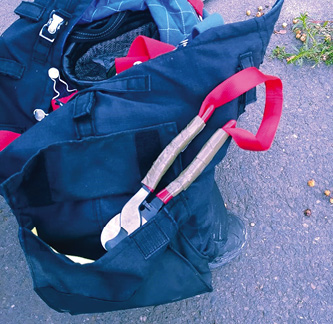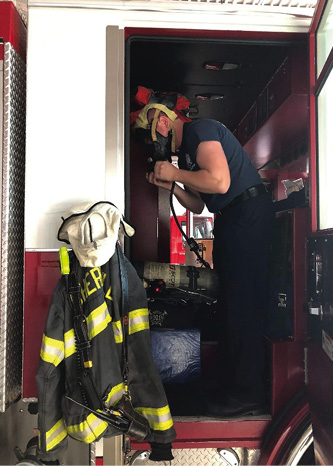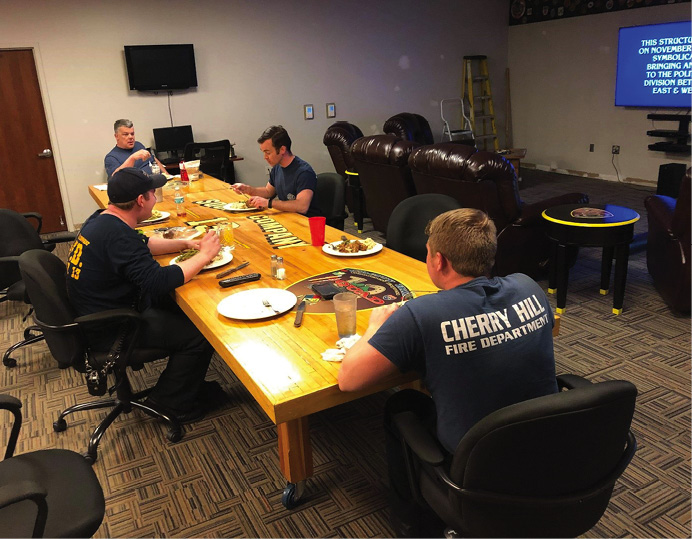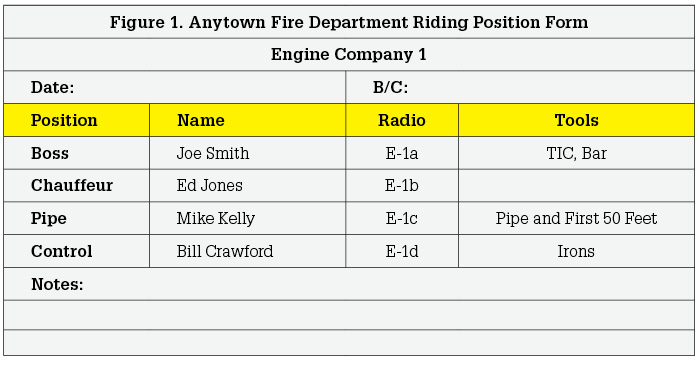There are many sayings that circulate in the fire service. One that has been around for decades goes along the lines of, “The first five minutes determine the next five hours.” At some point, most firefighters have seen the truth in this phrase. Operations managed correctly tend to go in the right direction; those that are not tend to end up as parking lots. If you subscribe to this school of thought, the logical question is, How do I set myself up for success in the first five minutes? I believe the way you start your shift determines how effective your operations will be. Here are some suggestions on how to gain a tactical advantage by managing the first hour of your day.
Structure helps tremendously in your efforts to gain an advantage on the fireground. I understand that often our well-thought-out plans last until the phone rings, with Headquarters on the other end of the line. We all work in dynamic environments, and things do not always go the way we plan. Regardless, we still need to plan, and we still need to be disciplined. If we just throw up our hands and say there is no use in planning, that defeatist mindset will find its way to the fireground.
Make a Plan
The first part of gaining a tactical advantage really starts before your first hour in the firehouse. If you are an officer, make some type of plan for your next tour before you leave your previous tour. If you are a firefighter, ask the officer what he is planning for the next work cycle. Often, our superiors change the plan. When that happens, just roll with it. As many times as this happens, there will be times when it does not, and on those days, you will be ahead of the game. On the days when your boss takes control of your schedule, at least you have something to fall back on. It is easier to modify an existing plan than it is to not have a plan at all.

(1) Roll call is a useful tool in setting the tone for the day and sharing critical information. [Photos courtesy of Lt. Zach Houck and the members of Squad Company 13A, Cherry Hill (NJ) Fire Department.]
To be prepared, you must gain situational awareness. Get your uniform ready and pack your bag the night before you go back to work. These simple steps will allow you to concentrate on your upcoming shift and not be consumed with little details.
Get to the firehouse early. Is the primary rig in service, or will you be running a reserve piece? If your normal apparatus is a tower ladder but the reserve rig is a straight stick, how does this change your tactics? What happens if the reserve engine only has a 750-gallon tank and your normal rig has a 1,000-gallon tank? Are there streets that are closed or hydrants that are out of service? All these items have an impact on tactical operations, and you should not be trying to figure them out as you go out the door on a run.
During Roll Call
Having a roll call in the engine room at the rig sets the tone for the day. This is a great way to disengage from the different aspects of life and focus on the mission of the fire department. This is where the officer can share his plan for the day and list any streets closed and any hydrants out of service. The more everyone knows, the fewer questions will come up on the fireground.
Roll call is a great place to go over riding and tool assignments. There is nothing wrong with confirming everyone knows exactly what is expected of them at a fire.
Roll call is also a great time to quiz your probies. Keeping the probies sharp will help keep everyone else sharp. This is also a great way to just get everyone together and build the team spirt and common focus.
Along with roll call, it is a good idea to have a riding position form (Figure 1). Even if this is not a formal policy in your department, take some initiative and develop your own. Using a form will add structure to your roll call and ensure everyone knows their role and function. The form will clarify who is in what riding position and their tool assignments. You can also identify what radio everyone will use and if there are any significant notes for the day. Look at it this way: A professional baseball team would not take the field without a lineup card. As minor as this might seem, constant attention to the basics will help ensure clarity among your members.
Check Gear/Workspace
The military uses the concept of first, second, and third line gear. First line gear is what the individuals carry on them at all time. We can relate this to what individual firefighters carry in their bunker gear. Exactly what to carry is a discussion for another day. What is important is that you build a good habit of checking what you carry. Most of it is for that one-time special circumstance. For example, many firefighters carry wire cutters in case they become entangled in a collapse scenario. That’s a good idea until you find yourself caught up in cable wire and your wire cutters are rusted shut. By putting your hands on your first line gear every day, you will ensure that the tools you need in a crisis are ready to go. This habit will also build in the muscle memory so you do not have to stop and think, “What pocket are my wire cutters, webbing, and door chock in?” The ability to be reflexive could mean a lot at crunch time.
After you check your first line gear, it is time to “ready check your workspace.” Many fire departments use some type of apparatus check procedure or form. In many cases, this becomes an exercise in filling out paperwork. Focus on your riding positions and the critical aspects of the positions. For example, if you are the nozzle firefighter, check your self-contained breathing apparatus, the hose loads, and the nozzles. If the hose load is sloppy, pull it and repack it. The roof firefighter on a truck company will want to start the saws and check the tools he is likely to take to a roof. Do not depend on the chauffeur to check your workspace. Take ownership of your riding position; that means being fully accountable for your tasks and tools that you will use to accomplish your mission.
Any time members of the 82nd Airborne Division make a parachute jump, they first go through concurrent airborne training at the point of departure. It does not matter if you are brand new to the division or you are a sergeant major with 300 jumps under your belt. Repetition of critical tasks ensures proficiency in high-stress environments.

(2) Check first line gear every day to keep you from coming up short at a critical time.

(3) Checking your workspace is a critical step in ensuring operational readiness and tactical effectiveness.

(4) Do not overlook the importance of building a cohesive team; having breakfast together during the first hour of your shift is a good way to reinforce the team concept
This concept applies very well to the fire service. Identify the critical skills for your company, and do some sets and reps every day in your first hour. If you are assigned to an engine company, pull line, throw a 24-foot ground ladder, or walk through catching a hydrant. If you are assigned to a truck company, throw a ladder or walk through the procedures for forcing an inward-swinging door. Not only will this help to build your muscle memory, but it’s another way to reinforce the importance of mission first and operational readiness.
A Collective Effort
There is no doubt that the fire service is a team endeavor. We respond as companies and operate as divisions and groups. The concept of collective effort is at the core of operational effectiveness. As important as the steps already outlined in this article are for gaining a tactical advantage, the importance of building a strong team cannot be overstated.
Morning rituals like having breakfast together are a great tool. Maybe you save the big morning feast for the weekend or a specific day every month, but the act of everyone sitting together in a relaxed environment is very healthy.
Make this casual—everyone in T-shirts. We all know who the boss is; this is the time to build the bonds of a strong team, not beat people over the heads with rank. Leave the phones in the locker room so everyone can be in the moment and not be preoccupied with social media. A strong team is built by sharing experiences; the social setting is an important part of this.
There are many things on the fireground we have absolutely no control over. What we can do is make the most out of what we can control. Managing the first hour of your shift sets the tone for operational readiness and fireground success. Little things done the right way will pay big dividends in the end.
Dennis Reilly is a 44-year veteran of the fire service and chief of the Pittsburg (KS) Fire Department. He has worked for several departments, including Cherry Hill (NJ) and Sunrise Beach (MO). He was one of the original members of the New Jersey Urban Search & Rescue Task Force 1 and deployed to Ground Zero on 9/11. He has an MPA from Penn State and is a CFO. In addition to his fire service career, Reilly is a combat veteran of the U.S. Army and worked as a private security contractor in Iraq and Afghanistan.
MORE DENNIS REILLY


